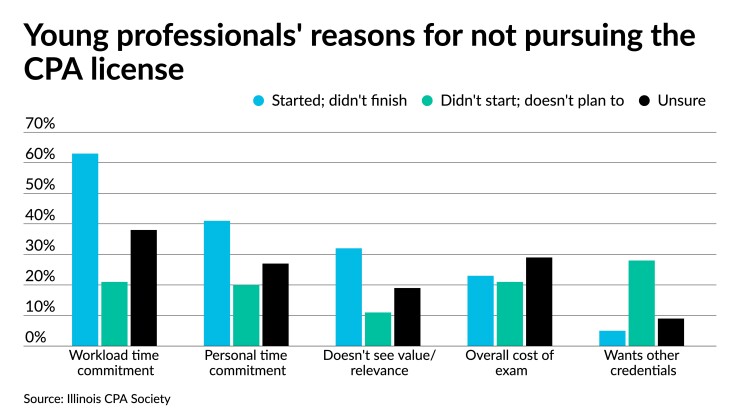Well, is it?
Let me say straight off that this is a real question, not a rhetorical one, and that I’m not sure of the answer; in fact, I want to know what you think.
I’ve been wondering about this issue due to two things I heard during the American Institute of CPAs’ big Engage conference. The first was a pair of statistics cited by well-known consultant Allan Koltin, who said during a presentation that the percentage of students graduating with accounting degrees dropped from 2% in 1990 to only 1% in 2000; that decade happened to coincide with the profession’s large-scale move to requiring an extra year of college to become a CPA. (A quick look at the most recent AICPA data from the 2019 edition of their biannual Trends report says that while the absolute number of accounting students is growing, the number pursuing that fifth year is actually declining.)
The second was a passing quip by past AICPA chair Kimberly Ellison-Taylor to the effect that she would sooner give birth to her children again than have to retake the CPA exam.
The CPA exam is famously difficult, and having passed it is, rightly, worn as a badge of pride. But it’s still very daunting, and it’s only one part of what it takes to become a CPA; having to have 150 hours of college credits — the equivalent of a fifth year of school — is hardly attractive at a time when the crushing burden of student debt has become a national issue.
Students are struggling to afford that fifth year of school. Firms are so desperate for staff that they’re literally merging in other practices just to get warm bodies. More and more young accountants are deciding that the CPA exam — and the license that it leads to — simply aren’t worth it. Competition from outside the profession for many of the services CPAs provide is getting ever fiercer.

Firms are hiring non-CPAs for posts where they used to require a license; the Big Four are cutting back on their hiring of accountants in favor of other skill sets (even as Ernst & Young
At the early height of the COVID-19 pandemic, with health care systems in some parts of the country overwhelmed and front-line medical staff struggling, many medical schools allowed their students to graduate early to help. No one would suggest that these doctors were any less capable than their predecessors, and they filled a crucial need.
The CPA profession isn’t in the midst of anything like a national medical emergency, but it is facing serious staffing challenges and long-term threats around its ability to attract future professionals. Is it time to revisit the 150-hour rule? Or to consider finding ways to make the CPA exam less of a gruelling nightmare? Is it even possible to make it easier to become a CPA — or to spread the process out so it’s at least easier to manage — without sacrificing the skills and knowledge that make accountants their clients’ most trusted advisors?
As I said at the beginning, this is a real question, and I want to know your thoughts on whether it’s possible or desirable to make it easier to become a CPA; we’ll share as many of them as we can in our October issue. (Update: Since we published this in September, we've been flooded with replies — many thanks to everyone who shared their thoughts, which are shared





